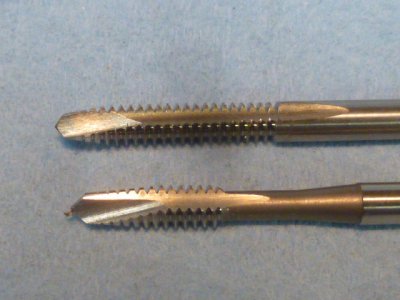- Joined
- Dec 8, 2013
- Messages
- 2,651
That's a (misnamed[1]) spiral flute tap. Good for blind holes as it throws the chips out like a twist drill. A spiral point tap (also misnamed[1]) has the flutes angled in the other direction (just at the tip) to throw the chips forward out the bottom of a through hole. That also appears to be a bottoming tap.
[1] It's a helix, not a spiral. Twist flute or twist point would make more sense.


